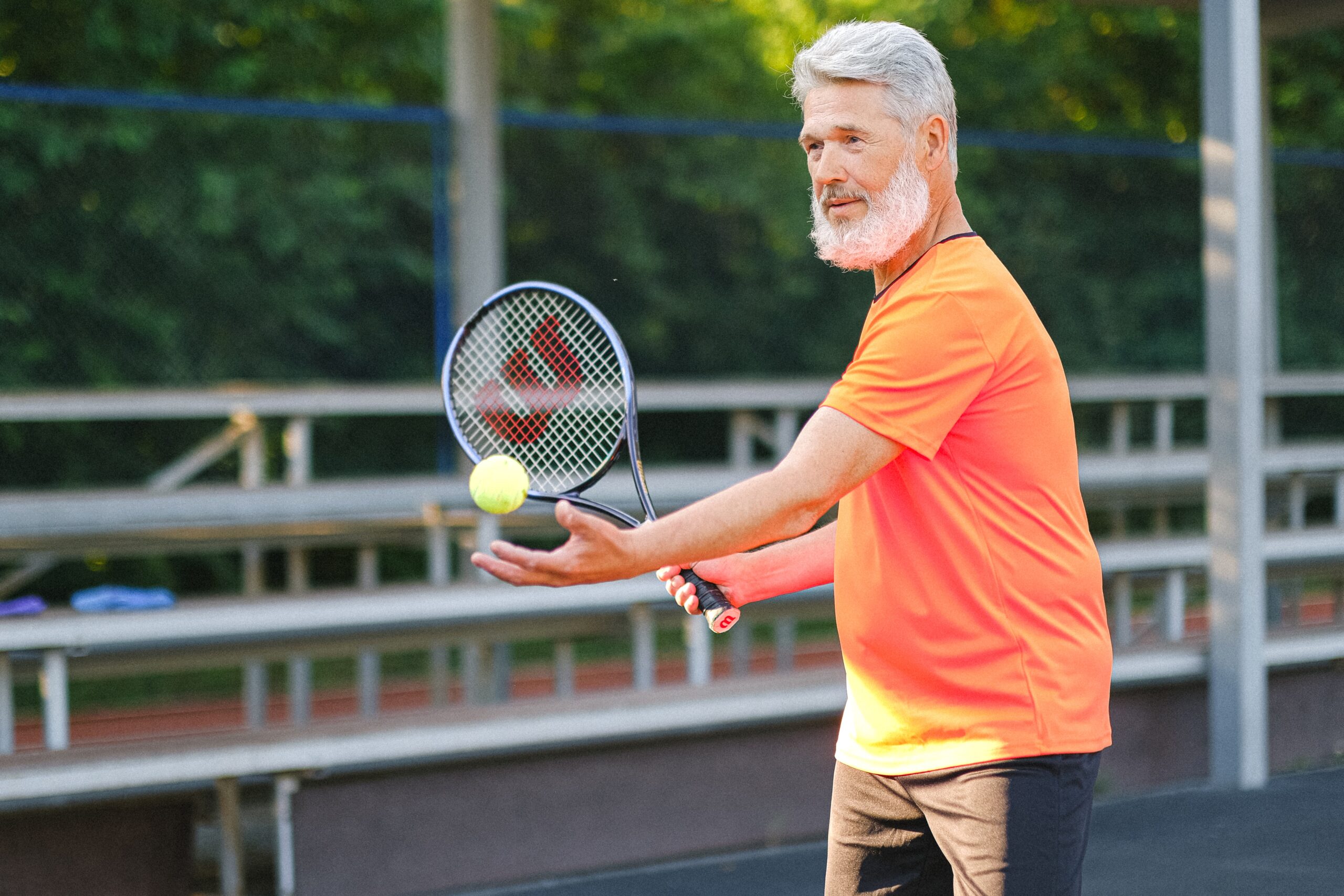Aging gracefully is a goal that many of us strive for, and maintaining healthy habits is the key to achieving it. As an expert in writing engaging blog posts, I am here to share valuable insights on how to age gracefully and adopt long-term wellness practices. Genetics play a role in the aging process, but there are several factors within our control that can influence how we age. Regular exercise, a healthy diet, and regular doctor visits are essential elements for healthy aging. Additionally, taking care of our mental health and participating in activities that stimulate the brain are equally important. In this blog post, I will delve into the factors that influence healthy aging and provide practical tips on how to incorporate these habits into your daily routine. Let’s embark on this journey together and discover how to age gracefully with optimal health and well-being.

Key Takeaways:
- Factors that influence healthy aging include genetics, exercise, a healthy diet, regular doctor visits, and mental health care.
- Regular exercise is associated with a longer and better quality of life, and it can help maintain muscle mass and prevent age-related decline in muscle function.
- Making smart food choices, such as following a Mediterranean-style eating pattern or the MIND diet, can protect against certain health problems and improve brain function.
- Getting enough sleep is important for overall health and can improve memory, mood, and decision-making skills.
- Quitting smoking at any age can improve health and increase life expectancy.
Factors that Influence Healthy Aging
As we age, it’s important to prioritize our health and well-being. Healthy aging is influenced by various factors, including genetics, exercise, a healthy diet, regular doctor visits, and mental health care. By understanding and implementing these factors, we can age gracefully and maintain long-term wellness.
Genetics
While we cannot control our genetics, they do play a role in how we age. Some individuals may be genetically predisposed to certain health conditions or have a higher risk of age-related diseases. However, it’s essential to remember that genetics are only one piece of the puzzle. Even if we have a genetic predisposition, we can still take proactive steps to maintain our health through other factors such as exercise and a healthy lifestyle.
Exercise
Regular exercise is a key component of healthy aging. It is associated with a longer and better quality of life, and it can help maintain muscle mass and prevent age-related decline in muscle function. Engaging in physical activity helps improve cardiovascular health, maintain a healthy weight, and reduce the risk of chronic diseases such as diabetes and heart disease. Endurance and aerobic exercises, strength exercises, balance exercises, and flexibility exercises are all important for older individuals. Experts recommend aiming for 2.5 hours of physical exercise each week.
Healthy Diet
Making smart food choices is another crucial factor in healthy aging. Following a Mediterranean-style eating pattern or the MIND diet can protect against certain health problems and improve brain function. These diets prioritize nutrient-rich foods such as fruits, vegetables, whole grains, lean proteins, and healthy fats while limiting unhealthy additives. It’s recommended to eat at least five servings of fruits and vegetables every day to ensure an adequate intake of essential vitamins and minerals. A diet rich in nutrients supports both brain and body health and may reduce the risk of aging-related diseases.
Regular Doctor Visits
Regular check-ups with a doctor are essential for healthy aging. These visits can help catch chronic diseases early, monitor existing health conditions, and improve overall quality of life. By staying on top of preventive screenings and addressing any health concerns promptly, we can take proactive measures to maintain our well-being as we age.
Mental Health Care
Taking care of our mental health is just as important as taking care of our physical health. Managing social isolation, loneliness, stress, depression, and mood through medical and self-care is crucial for healthy aging. Participating in hobbies, leisure activities, and mentally stimulating activities can lower the risk of certain health problems and improve cognitive function. Challenging the brain with new tasks and learning can help maintain brain function as we age.
It’s never too late to adopt new healthy habits for long-term wellness. By making small changes in our daily lives, such as quitting smoking, following a Mediterranean-style diet, getting regular exercise, and maintaining a healthy weight, we can decrease the risk of death by 80%. Prioritizing sleep, managing stress, nurturing relationships, and staying connected with others also contribute to healthy aging.
In conclusion, healthy aging is influenced by a combination of factors, including genetics, exercise, a healthy diet, regular doctor visits, and mental health care. By incorporating these factors into our lives, we can age gracefully and maintain long-term wellness. Remember, it’s never too late to prioritize our health and make positive changes for a better future.
Role of Exercise in Aging Gracefully
Aging gracefully is a goal that many of us have as we grow older. We want to maintain our health, vitality, and independence for as long as possible. While genetics and other factors certainly play a role in healthy aging, one of the most important contributors is regular exercise. Exercise has numerous benefits for older adults, including maintaining muscle mass, preventing age-related decline, and improving overall quality of life.
Benefits of Regular Exercise
Regular exercise is associated with a longer and better quality of life. It can help improve cardiovascular health, strengthen bones, and reduce the risk of chronic diseases such as heart disease, diabetes, and certain types of cancer. Exercise also plays a crucial role in maintaining mental well-being by reducing the risk of depression and anxiety.
Maintaining Muscle Mass
As we age, we naturally start to lose muscle mass, which can lead to frailty and a decline in physical function. Regular exercise, particularly strength training exercises, can help combat this loss of muscle mass. By engaging in activities that challenge our muscles, such as lifting weights or using resistance bands, we can preserve and even increase muscle mass, leading to improved strength and mobility.
Prevention of Age-Related Decline
Age-related decline in muscle function, known as sarcopenia, can significantly impact our daily lives. It can make simple tasks like walking up stairs or carrying groceries more challenging. However, regular exercise can help prevent or slow down this decline. By engaging in activities that improve balance, coordination, and flexibility, such as yoga or tai chi, we can reduce the risk of falls and fractures.
Recommended Exercise Duration
Experts recommend aiming for 2.5 hours of physical exercise each week. This can be achieved through a combination of cardiovascular exercises, strength training, balance exercises, and flexibility exercises. It’s important to find activities that you enjoy and that are suitable for your fitness level. Whether it’s going for a brisk walk, swimming, or joining a fitness class, the key is to stay active and make exercise a regular part of your routine.
Exercise is a powerful tool for aging gracefully. It can increase mobility, prevent falls and fractures, and reduce the risk of diseases associated with aging. By incorporating regular exercise into our lives, we can maintain our muscle mass, prevent age-related decline, and improve our overall quality of life. So, let’s lace up our sneakers, get moving, and embrace the benefits of exercise as we age.
To learn more about healthy aging and the role of exercise, you can refer to the National Institute on Aging’s free booklet.
Smart Food Choices for Long-Term Wellness
As we age, it becomes increasingly important to make smart food choices to support our long-term wellness. Fortunately, there are several eating patterns that have been shown to protect against certain health problems and improve brain function. In this section, we will explore the Mediterranean-style eating pattern, the MIND diet, and the benefits they offer for healthy aging.
Mediterranean-Style Eating Pattern
The Mediterranean-style eating pattern is known for its emphasis on whole foods, such as fruits, vegetables, whole grains, legumes, nuts, and seeds. This eating pattern also includes moderate amounts of fish, poultry, and dairy products, while limiting red meat and processed foods. One of the key components of the Mediterranean-style eating pattern is the use of healthy fats, such as olive oil, in cooking and as a dressing for salads.
Research has shown that following a Mediterranean-style eating pattern can have numerous health benefits. It is associated with a reduced risk of heart disease, stroke, and certain types of cancer. Additionally, this eating pattern may support the brain’s ability to think and remember, potentially reducing the risk of age-related cognitive decline.
MIND Diet
The MIND diet, which stands for Mediterranean-DASH Diet Intervention for Neurodegenerative Delay, is a hybrid of the Mediterranean-style eating pattern and the DASH (Dietary Approaches to Stop Hypertension) diet. It specifically focuses on foods that are beneficial for brain health.
The MIND diet includes foods such as berries, leafy green vegetables, nuts, whole grains, fish, poultry, and olive oil. It also suggests limiting the consumption of red meat, butter and margarine, cheese, pastries and sweets, and fried or fast food.
Research has shown that following the MIND diet may help protect against cognitive decline and reduce the risk of developing Alzheimer’s disease. It is thought that the combination of specific nutrients and antioxidants found in the MIND diet may have a positive impact on brain health.
Protection against Health Problems
In addition to the Mediterranean-style eating pattern and the MIND diet, making smart food choices can protect against a range of health problems. Prioritizing nutrient-rich foods, limiting foods with unhealthy additives, and consuming five servings of fruits and vegetables every day are all important steps in maintaining long-term wellness.
A diet that includes plenty of nutrients, vitamins, and minerals not only keeps the brain and body healthy but may also reduce the risk of aging-related diseases. By incorporating these foods into our daily meals, we can support our overall health and well-being as we age.
Improving Brain Function
As we age, it’s natural for cognitive function to decline. However, there are steps we can take to help maintain brain function and slow down this decline. In addition to following a Mediterranean-style eating pattern and the MIND diet, there are other strategies we can incorporate into our daily lives.
Participating in hobbies, leisure activities, and mentally stimulating activities can lower the risk of certain health problems and improve cognitive function. Additionally, challenging the brain with new tasks and learning can help maintain brain function as we age.
It’s important to remember that it is never too late to adopt new healthy habits for long-term wellness. Making good-for-you changes like quitting smoking, following a Mediterranean-style diet, getting regular exercise, and maintaining a healthy weight can decrease the risk of death by 80%. By prioritizing our health and making small changes in our daily lives, we can age gracefully and enjoy a higher quality of life.
To learn more about healthy aging and the steps you can take to optimize your health as you grow older, the National Institute on Aging provides a free booklet called “What Do We Know About Healthy Aging?” that offers valuable information and guidance.
In conclusion, making smart food choices is an important aspect of long-term wellness. By following eating patterns such as the Mediterranean-style eating pattern and the MIND diet, and incorporating other strategies to improve brain function, we can protect against health problems and age gracefully. Remember, it’s never too late to prioritize your health and make positive changes for a brighter future.
Importance of Sleep for Overall Health
Sleep is often overlooked when it comes to maintaining overall health and wellness. We often prioritize exercise and nutrition, but getting enough quality sleep is just as important. In fact, research has shown that sleep plays a crucial role in various aspects of our health, including memory, mood, and decision-making skills.
Improvement in Memory
Have you ever pulled an all-nighter and then struggled to remember even simple things the next day? That’s because sleep is essential for memory consolidation. When we sleep, our brains process and store information, helping us retain what we’ve learned throughout the day. So, if you want to enhance your memory and cognitive abilities, getting enough sleep is key.
Mood and Emotional Well-being
Lack of sleep can have a significant impact on our mood and emotional well-being. Have you ever noticed how irritable and moody you feel after a restless night? Sleep deprivation can lead to increased irritability, anxiety, and even depression. On the other hand, getting enough quality sleep can improve your mood, making you feel more positive and emotionally balanced.
Decision-Making Skills
Do you find it harder to make decisions when you’re sleep-deprived? It’s not just in your head. Lack of sleep can impair our cognitive functions, including decision-making skills. Studies have shown that sleep deprivation can affect our ability to evaluate risks, make sound judgments, and solve problems effectively. So, if you have an important decision to make, make sure you’re well-rested to optimize your cognitive abilities.
Addressing Underlying Medical Conditions
Sometimes, poor sleep quality or insomnia can be symptoms of underlying medical conditions. Sleep apnea, for example, is a common sleep disorder that can disrupt your sleep and lead to various health problems. It’s important to address any underlying medical conditions that may be affecting your sleep to ensure you’re getting the rest you need for optimal health.
If you’re struggling with sleep issues, it’s always a good idea to consult with a healthcare professional who can help diagnose and treat any underlying conditions. Taking steps to improve your sleep can have a significant impact on your overall health and well-being.
Click here to learn more about healthy aging and the importance of sleep from the National Institute on Aging.
Remember, prioritizing sleep is not just a luxury but a crucial aspect of maintaining your overall health. So, make sure to create a sleep routine that allows you to get enough quality rest each night. Your body and mind will thank you for it!
Making Lifestyle Changes for Long-Term Wellness
As we age, it’s important to prioritize our health and well-being. Making lifestyle changes can greatly impact our long-term wellness and help us age gracefully. In this section, we will explore several key aspects of maintaining a healthy lifestyle, including quitting smoking, limiting alcohol consumption, regular doctor check-ups, and managing mental health.
Quitting Smoking
One of the most significant changes we can make for our health is to quit smoking. Whether you’ve been smoking for years or just recently picked up the habit, quitting at any age can have profound benefits. Not only does quitting smoking improve your overall health, but it can also increase your life expectancy. Smoking is a leading cause of various diseases, including cancer, heart disease, and lung disease. By quitting smoking, you can significantly reduce your risk of developing these serious health conditions.
Limiting Alcohol Consumption
While enjoying an occasional drink can be a part of a social lifestyle, it’s important for older adults to avoid or limit alcohol consumption. Heavy drinking can contribute to poor heart health and accelerate the aging process. By moderating your alcohol intake, you can protect your heart and overall well-being. It’s always a good idea to speak with your doctor about what is considered a safe and healthy level of alcohol consumption for you.
Regular Doctor Check-Ups
Regular check-ups with your doctor are crucial for maintaining your health as you age. These check-ups can help catch chronic diseases early on, allowing for better management and improved quality of life. Additionally, your doctor can provide guidance on preventive care measures, such as vaccinations and screenings, that can help prevent or detect potential health issues. By staying on top of your medical appointments, you can prioritize your long-term wellness.
Managing Mental Health
Taking care of your mental health is just as important as caring for your physical well-being. As we age, it’s common to experience social isolation, loneliness, stress, depression, and mood changes. It’s important to address these issues through medical care and self-care strategies. Engaging in hobbies, leisure activities, and mentally stimulating activities can lower the risk of certain health problems and improve cognitive function. Additionally, managing stress through exercise, meditation, and connecting with others can help promote healthy aging.
In conclusion, making lifestyle changes for long-term wellness is essential for aging gracefully. By quitting smoking, limiting alcohol consumption, attending regular doctor check-ups, and managing mental health, we can prioritize our overall well-being as we age. These small changes in our daily lives can have significant health benefits and reduce the risk of age-related diseases. Remember, it’s never too late to adopt new healthy habits and improve your long-term wellness.
To learn more about healthy aging, you can refer to the National Institute on Aging’s free booklet titled “What Do We Know About Healthy Aging?” It offers valuable steps and information to optimize your health as you grow older.
Engaging in Hobbies and Mentally Stimulating Activities
As we age, it becomes increasingly important to prioritize our overall wellness and take proactive steps to age gracefully. While factors such as genetics, exercise, a healthy diet, regular doctor visits, and mental health care all play a role in healthy aging, engaging in hobbies and mentally stimulating activities can also have significant benefits. In this section, we will explore the link between participating in leisure activities and reducing the risk of certain health problems, as well as improving cognitive function.
Risk Reduction and Cognitive Function Improvement through Leisure Activities
Participating in hobbies and leisure activities not only provides enjoyment and fulfillment but also offers numerous health benefits. Research has shown that engaging in mentally stimulating activities can lower the risk of certain health problems and contribute to improved cognitive function. By keeping our minds active and engaged, we can reduce the risk of cognitive decline and maintain mental sharpness as we age.
Mentally Stimulating Tasks
One of the key ways to engage our minds and reap the benefits of mentally stimulating activities is by challenging ourselves with new tasks and learning. Just like physical exercise is essential for maintaining physical health, exercising the brain through learning new things is crucial for maintaining brain function. Whether it’s picking up a new hobby, learning a musical instrument, or taking up a new language, these activities can help stimulate neural pathways and promote cognitive health.
In addition to learning new things, participating in hobbies can also provide a sense of purpose and fulfillment, which contributes to overall mental well-being. Whether it’s painting, gardening, playing chess, or writing, finding activities that bring joy and engage the mind can have a positive impact on our mental health as we age.
It’s worth noting that participating in clinical research studies can not only contribute to the scientific process but also potentially improve our own lives. These studies help researchers gain a deeper understanding of aging-related issues and develop interventions to promote healthy aging.
In conclusion, engaging in hobbies and mentally stimulating activities is a valuable component of aging gracefully and maintaining long-term wellness. By challenging our minds, we can reduce the risk of certain health problems and improve cognitive function. So why not start exploring new hobbies or rekindling old ones? It’s never too late to adopt new healthy habits and embark on a journey of lifelong learning and fulfillment.
For more information on healthy aging, the National Institute on Aging provides a free booklet called “What Do We Know About Healthy Aging?” that offers steps to optimize health as one grows older. 1
Small Changes for Significant Health Benefits
As we age, it’s important to prioritize our health and make small changes in our daily lives that can have significant long-term benefits. Aging gracefully and maintaining our wellness should be a top priority, and there are several habits we can adopt to achieve this goal. In this section, we will explore some key areas where small changes can make a big difference in our overall health and well-being.
Reducing Risk of Alzheimer’s and Related Dementias
One of the biggest concerns as we age is the risk of developing Alzheimer’s disease and other forms of dementia. However, research has shown that making certain lifestyle changes can help reduce this risk. By engaging in mentally stimulating activities, such as learning new skills or participating in hobbies, we can keep our brains active and lower the likelihood of cognitive decline. Additionally, following a Mediterranean-style diet or the MIND diet, which emphasize nutrient-rich foods like fruits, vegetables, whole grains, and fish, can improve brain function and protect against age-related cognitive decline.
To further support brain health, it’s important to manage stress and maintain social connections. Chronic stress can have detrimental effects on both our physical and cognitive health, so finding healthy outlets for stress, such as exercise or meditation, is crucial. Additionally, nurturing relationships and staying connected with others can help combat feelings of loneliness and social isolation, which have been linked to an increased risk of cognitive decline.
Increasing Mobility
Maintaining mobility is essential for independent living and a high quality of life as we age. Regular physical exercise plays a key role in increasing and preserving mobility. Endurance and aerobic exercises, such as walking or swimming, can improve cardiovascular fitness and stamina. Strength exercises, like lifting weights or using resistance bands, help maintain muscle mass and prevent age-related decline in muscle function. Balance exercises, such as yoga or tai chi, can reduce the risk of falls and fractures. Finally, flexibility exercises, like stretching or Pilates, promote joint health and range of motion.
Experts recommend aiming for at least 2.5 hours of physical exercise each week. This can be achieved through a combination of different types of exercises, tailored to individual abilities and preferences. By incorporating regular exercise into our routine, we can increase mobility, prevent falls, and reduce the risk of diseases associated with aging.
Reducing Disease Risks
As we age, the risk of developing chronic diseases, such as heart disease, diabetes, and certain cancers, increases. However, by making small changes to our lifestyle, we can significantly reduce these risks and improve our overall health. One of the most important factors is maintaining a healthy diet. Prioritizing nutrient-rich foods, limiting unhealthy additives, and consuming five servings of fruits and vegetables every day can provide essential vitamins, minerals, and antioxidants that support our brain and body health.
A Mediterranean-style diet, which includes plenty of fruits, vegetables, whole grains, olive oil, and fish, has been shown to be particularly beneficial for heart health and may even support the brain’s ability to think and remember. In addition to a healthy diet, other lifestyle changes can also have a positive impact. Limiting alcohol consumption, prioritizing sleep, quitting smoking, and staying up to date with regular check-ups and health care are all important steps in reducing the risk of disease and promoting long-term wellness.
To learn more about healthy aging and the steps you can take to optimize your health, the National Institute on Aging provides a free booklet called “What Do We Know About Healthy Aging?” 1. This resource offers valuable insights and guidance for individuals of all ages who are interested in maintaining their well-being as they grow older.
In conclusion, small changes in our daily habits can have a significant impact on our health as we age. By reducing the risk of Alzheimer’s and related dementias, increasing mobility, and reducing disease risks through healthy lifestyle choices, we can age gracefully and enjoy a higher quality of life. It’s never too late to adopt new healthy habits for long-term wellness, and the benefits are well worth the effort.
Footnotes
⚠️Keto Meal Plan click 👇



